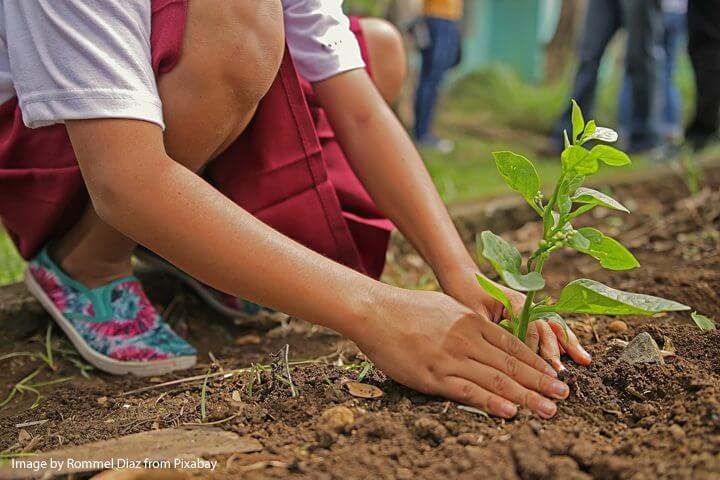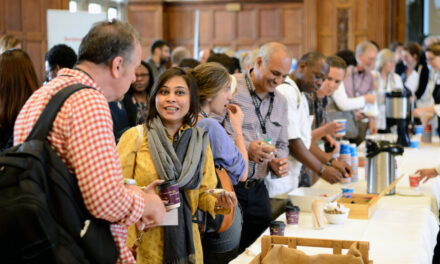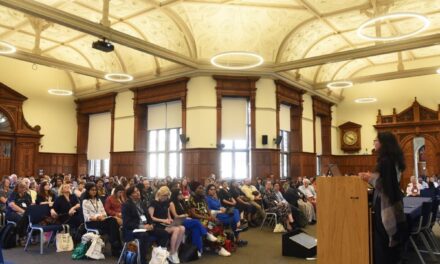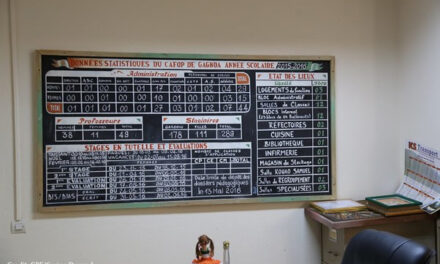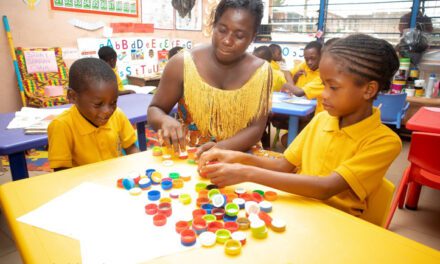This article is by the theme convenors of one of six 2023 UKFIET conference themes, ‘Conflict, crisis, climate and migration’: Chris Berry, Education Adviser, UK’s Foreign, Commonwealth & Development Office, Kate Haden, Senior Education Consultant, and Rachael Fitzpatrick, Senior Researcher, Education Development Trust. The convenors have gathered some highlights from conference sessions relating to their theme.
The conflict, crisis, climate and migration sub-theme at the September 2023 UKFIET conference was great fun to co-convene. We learnt a huge amount in a short space of time from a variety of different perspectives: researchers, implementers, donors and those that have directly benefited from quality education provision in crisis-affected contexts. Here’s our whistlestop tour of the highlights.
- Ways of working matter, especially in crisis
Our subtheme kicked off with a symposium focusing on bridging the humanitarian/development divide which looked at working in the ‘nexus’ between humanitarian and development support in crises. It unpacked issues around the challenges of financing, localisation, data, leadership and coordination in crisis contexts.
Success stories were shared in the learning lessons from crisis in Sub-Saharan Africa session: We heard from colleagues in Somalia, Nigeria and the Democratic Republic of Congo on how they mobilised communities to facilitate genuine engagement and co-construction of education initiatives with local and national stakeholders to recover and heal from unrest, conflict and trauma.
Similar messages were discussed in the symposium on the co-construction of research evidence for education in conflict and crisis settings, which brought together partners to discuss how they have been collaborating to build a more coherent framework for researching Education in Emergencies and Protracted Crises. The session highlighted the importance of a strong research partnerships to support in-depth political analysis, and a strong conceptual framework.
Technology can broker these important ways of working. We heard in the online session, greening education systems and resilience building in disaster risk reduction, about Save the Children’s Comprehensive School Safety Ecosystem project in the Philippines. Here, an app was developed for schools to report damage caused by cyclones that embedded child participation, and enabled local ownership and accountability to rebuild infrastructure.
- Effective teaching and learning in crisis- and conflict-affected contexts requires safe spaces
In a poignant statement posed in the foundational learning for social and environmental justice. Squaring circles? session, we were challenged to prioritise the fundamentals before learning the foundations can take place: potable water, food, health, a shared language, and safety. This includes safety from physical and emotional abuse and neglect.
This was illustrated in the inclusion, belonging and learning recovery and the building resilient education systems through crisis sessions. They highlighted the spiral of negative effects conflict, displacement, trauma and a lack of safety has on children’s education, aspirations, mental health, normalisation of violence, and deterioration of social cohesion.
A set of three papers from Myanmar helped participants to understand how crisis there is affecting children’s access to safe spaces to learn. Everyone from the panel was from Myanmar, showing the power of local voice and activism in tackling the fall-out from the political crisis. The session focused on the political challenges of working in ethnic held areas of the country to build systems, and engaging with the national education system.
A symposium focusing on language for resilience in Jordan, Uganda and Ukraine. This session really brought out both the similarities and differences between these three contexts in terms of how language can bring people together in a crisis. The groupwork gave participants the chance to deep dive into the three contexts.
- Reaching marginalised and vulnerable groups is hard, but possible
Reaching the most marginalised is a priority and focus for our work within the FCDO and Education Development Trust. It was highlighted in a creative session focusing on climate change and social justice. This was a very interactive session which brought home the pace of change with respect to climate change and how this impacts mostly on the poorest and most marginalised.
We saw the potential of EdTech in a symposium which reported on the results of research in Lebanon and Uganda into the effectiveness of its EdTech platform, Can’t Wait to Learn. We learnt how this play-based EdTech platform is improving outcomes for refugee children and some of the challenges in scaling the approach.
A session focused on reaching marginalised groups with disaster responses presented experiences from Zimbabwe, flooding in India, ethnic education in Myanmar and climate literacy in schools in Kenya. It was great to see research from such varied contexts shedding light on the resilience of marginalised groups in the face of disasters.
A study from Moldova in a session exploring ECED in Emergencies: How do we simultaneously expand delivery and measure what works? demonstrated that despite difficulties and challenges, reaching vulnerable populations is possible. The session shared great inspiration on providing quality ECD for Ukrainian refugees, through political will to drive system reform.
Final words
The conference ended with an inspiring plenary that focused on the power in partnerships. This was a strong message that spanned across the themes for this year’s conference, but voices from crisis- and conflict-affected contexts were prominent. As we move forward after the conference, it would be great to see researchers, policy-makers, programme funders, and implementers continuing to work together to ensure continuity of quality education in the face of conflict, crisis, climate and migration.

